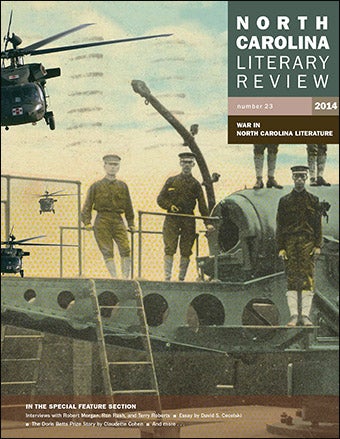‘IN-DEPTH EXPLORATION’
North Carolina Literary Review traces the scars of war in 23rd issue
For its 2014 print issue, North Carolina Literary Review devotes its special feature section to “War in North Carolina Literature.” This in-depth exploration includes an interview with author Robert Morgan, who points out, “It is one of the mysteries of human life, and human history that intelligent people, often ethical people, kill each other so often and on such a scale.”
Readers will also find David Cecelski’s fascinating analysis of recordings made by a young Arthur Miller (well before he became one of America’s greatest playwrights) during a visit to Wilmington in the fall of 1941, just weeks before the United States – and Wilmington – were forever changed by the second world war.

There is also a discussion with Ron Rash and Terry Roberts about the World War I German internment camp that existed in North Carolina and is central to novels by both authors; an essay about a post-apocalyptic civil war in William Forstchen’s novel “One Second After”; and an essay about little-known African American author James McGirt, who wrote about black soldiers in the Spanish-American War.
These join Claudette Cohen’s short story “The Mayor of Biscoe,” winner of the 2013 Doris Betts Fiction Prize, which details the struggle of life for a soldier after he has left the battlefield. Quoting Robert Morgan in her introduction to the section, NCLR Editor Margaret Bauer writes, “Cohen understands, as do these other insightful writers, that there is no ‘delight’ in war.”
The 2014 “Flashbacks” section, with essays and poetry by and about writers featured in past issues, includes an essay by Paul Baggett on author Charles Chesnutt’s “Marrow of Tradition,” which is based on the Wilmington coup d’etat of 1898, as well as Jordan Stone’s essay on Michael Malone’s 1983 novel “Handling Sin.” In addition, Allan Gurganus flips from author to subject in Zackary Vernon’s essay, which delves into the Halloween horror show, held each year at Gurganus’s home, and Shirley Stave takes a look at Lee Smith’s 2002 novel “The Last Girls.” These essays accompany poems by Susan Laughter Meyers, winner of the 2013 James Applewhite Poetry Prize, as well as poems by James Applewhite, for whom the competition is named, and Fred Chappell, who served as final judge for last year’s competition.
Great work also finds a home in NCLR in the “North Carolina Miscellany” section, which this year features paintings by the writer Clyde Edgerton together with the poetry from Hannah Bonner, another of the 2013 Applewhite competition finalists. And Annie Frazier, daughter of “Cold Mountain” author Charles Frazier, shows off her own literary talents in the short story “Sakura,” a finalist for the 2013 Doris Betts Fiction Prize. “You will see when you read her story that writing talent runs in the family,” writes Bauer.
Included in the latest issue is an announcement of a new NCLR creative nonfiction competition in 2015, with the winner published in the 2016 edition, to celebrate the 25th issue of NCLR. The Alex Albright Creative Nonfiction Prize, named for the founding editor, will be open to any writer who fits the NCLR definition of a North Carolina writer: anyone who currently lives in North Carolina, has lived in North Carolina, or uses North Carolina as subject matter.
The issue also announces next year’s theme: “Global North Carolina,” and invites writers to submit for this issue by Aug. 31.
The cover art for NCLR 2014 was designed by Dana Ezzell Gay, an associate professor at Meredith College in Raleigh and NCLR Art Director since 2008. Other contributing designers include Gay’s student Karen Baltimore; Stephanie Whitlock Dicken, who teaches at Pitt Community College; and Dave Cox of Five to Ten Design in Washington, North Carolina.
Published by East Carolina University and the North Carolina Literary and Historical Association, NCLR has won numerous awards. NCLR 2014 has been mailed to subscribers and will be available in independent bookstores across the state. To subscribe to the print issue, go to www.nclr.ecu.edu.